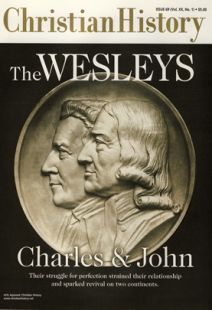The Wesleys: Did You Know?
Christmas Miracle
When Charles was born, on December 18, 1707, his parents thought he was dead because he neither cried nor opened his eyes. He was several weeks premature, so they wrapped him in wool until the day he should have been delivered. He eventually came around and apparently had a healthy childhood. His parents lost eight or nine other children in infancy.
Books Are Made for Walking
The Wesley brothers never hitched a ride from college—they walked the 150 miles to Epworth instead. The journey was often marred by bad roads, inclement weather, and even highwaymen. To make matters worse, the brothers read books while they walked. The trip scared their father so badly that he once told them, “I should be so pleased to see ye here this spring, if it was not upon the hard conditions of your walking hither.” John maintained that reading for 10 of his 25 daily miles never caused any harm.
Prickly Peer
The curmudgeonly Samuel Johnson (1709 –1784) had mixed feelings about the Wesleys. He knew John at Oxford, and said of him, "John Wesley’s conversation is good, but he is never at leisure. He is always obliged to go at a certain hour. This is very disagreeable to a man who loves to fold his legs and have out his talk, as I do.” Johnson later applauded Oxford’s expulsion of six Methodist students (see page 22), which could hardly have endeared him to the movement’s founding family. Yet at the end of his life, he wanted to invite John’s brilliant but financially restricted sister Martha to live at his house. Unfortunately, Johnson died before his wish could be carried out.
"An Odd Way of Thinking”
Susanna Wesley was not quite sure what to make of her sons’ heart-warming conversion experiences. She wrote to Charles, “I think you are fallen into an odd way of thinking. You say that till within a few months you had no spiritual life, nor any justifying faith. Now this is as if a man should affirm he was not alive in his infancy, because when an infant he did not know he was alive. All, then, that I can gather from your letter is that till a little while ago you were not so well satisfied of your being a Christian as you are now.”
Pepper-upper
Charles could sympathize with today’s caffeine addicts. In 1746 he tried to give up tea, but writes, “my flesh protested against it. I was but half awake and half alive all day; and my headache so increased toward noon, that I could neither speak nor think. . . . This so weakened me, that I could hardly sit my horse.”
Thanks, but No Thanks
Though the Methodists earned early acclaim for their ministry to marginalized groups such as prisoners, orphans, and the ill, they later became so unpopular that even these doors closed to them.
As John recorded in his journal for February 22, 1750, “So we are forbid to go to Newgate [a prison], for fear of making them wicked; and to Bedlam [an asylum], for fear of driving them mad!”
Not Dead Yet
In 1753, John became so ill that his doctor thought he would die. Just in case, John penned this epitaph:
Here lieth the Body
of
John Wesley
A brand plucked out of the burning:
who died of a consumption in the fifty-first year of his age,
not leaving, after his debts are paid,
ten pounds behind him:
praying,
God be merciful to me, an unprofitable servant!
John, whose mother had called him “a brand plucked out of the burning” after he was rescued from a house fire in 1709, resolved to cheat death again. Two days after he wrote the epitaph, he made himself a poultice of brimstone (sulfur), egg white, and brown paper, which immediately relieved his pain. He recovered and lived another 38 years.
Ready to Rumble
After increasingly severe earthquakes in England on February 8 and March 8, 1750, a self-proclaimed prophet predicted another quake in April that would destroy half of London. The city went berserk. Charles wrote 19 hymns on the subject and published a sermon called “The Cause and Cure of Earthquakes.” On the foretold night, John reported, “Places of worship were packed, especially the chapels of the Methodists.” Nothing happened.
By Elesha Coffman
[Christian History originally published this article in Christian History Issue #69 in 2001]
Next articles
The Wesleys: From the Editors — Innovating with the Flow
Though the Wesleys are known as evangelical pioneers, the momentum for the movement they founded had been building long before they arrived.
Elesha CoffmanChristian History Timeline: The Wesleys
Chronology of key events in the lives of the Wesleys and their movement.
the EditorsThe Wesleys: Recommended Resources
Resources for further study of the Wesleys and of Methodism.
the EditorsA Polysemantic Country Song?
If you still can’t grasp what Dante meant to say in the Comedy, this may (or may not) help.
DanteSupport us
Christian History Institute (CHI) is a non-profit Pennsylvania corporation founded in 1982. Your donations support the continuation of this ministry
Donate



